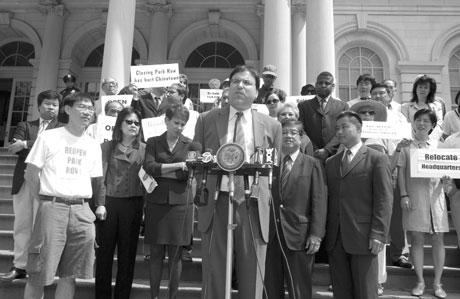By Josh Rogers
Mayor Mike Bloomberg said last week that the city doesn’t always strike the right balance between security and personal freedom and he indicated a willingness to look again at loosening the security protections near Police Headquarters and Park Row.
Bloomberg answered a question on the issue Aug. 5, the day after State Supreme Court Judge Walter Tolub ruled that the Police Dept. must end the “occupation” by police vehicles of James Madison Plaza by the end of the year and conduct an environmental study of the effects of closing Park Row to pedestrians, city buses and all non-emergency vehicles.
“We’re always going to have to struggle to find the right balance between openness and personal rights, and providing security,” Bloomberg said, adding that all levels of government try to get the balance right. “Sometimes we do, sometimes we don’t….
“I’m a big believer that if you keep people from moving around reasonably freely, if you take away people’s personal rights in the interests of security, then the terrorists win without firing a shot,” Bloomberg said. “You can’t let that happen.”
Bloomberg has said previously that he would rely on Police Commissioner Raymond Kelly to decide whether to reopen Park Row, which has been closed since the Sept. 11 terror attacks to protect headquarters at One Police Plaza.
Residents of Chatham Green and Chatham Towers and local politicians filed a lawsuit earlier this year on the street closure and rallied outside Bloomberg’s office at City Hall on Aug. 6 to celebrate Judge Tolub’s decision.
“We’ve lived under a reign of anti-terror,” said Danny Chen, a member of the board of directors of Chatham Green. He and his neighbors have to pass checkpoints to get to their homes. Residents say the closure has caused traffic jams on nearby streets and has lengthened trips that used to take five minutes to 45 minutes.
Officials with NYU Downtown Hospital told Judge Tolub that the closure could endanger the lives of Chatham residents by slowing down ambulances.
Assembly Speaker Sheldon Silver, a plaintiff in the lawsuit, said Tolub’s decision should form the basis for the city to finally negotiate a reasonable way to reopen the street. Silver and other local politicians met with Kelly a few months ago to discuss Park Row, but Silver said the commissioner did not seem flexible.
One of the cases Tolub relied on to make his decision was Silver vs. Dinkins, a 1989 suit filed by Assemblymember Silver. Mayor David Dinkins had moved a prison barge to Pier 35 near Montgomery St. on the East River and Silver said that after losing the suit, the city decided to negotiate and agreed to move the prisoners.
Tolub ruled that the city must complete an environmental assessment of the effects of the Park Row closure by the end of the year. The assessment will determine whether a more elaborate environmental impact statement is required.
Jack Lester, who represented the plaintiffs, said given all of the traffic changes it is clear that an E.I.S. will be required. He said the ruling provides a “road map that will lead to the eventual reopening of Park Row.”
“We are confident they will not appeal,” Lester added. “That would be an exercise in futility.”
He said under the decision, the police will not be allowed to decide unilaterally what their security needs are, but he stopped short of saying that a court might some day force the street to be reopened over the objections of the N.Y.P.D.
Councilmember John Liu of Queens, the city’s first Asian-American councilmember, joined Silver, Councilmember Alan Gerson and U.S. Rep. Nydia Velazquez at the rally. Liu said that Chinatown was “the community that has suffered the most since 9/11.”
He said he didn’t think the street closure was motivated by racism, but he did think the police may have mistakenly thought that people in Chinatown would accept the closure quietly.
Henry Stern, the city’s former Parks commissioner, said at a rally two weeks ago that he did not think race was the motivating factor either, but he added, “I have a feeling that if this was Park Ave. instead of Park Row, this would not have been closed.”
Stern said he was dismayed to see police cars parked on any public plaza, particularly one he named. He said he named James Madison Plaza after the fourth president because it is at the intersection of St. James Place and Madison St.



































